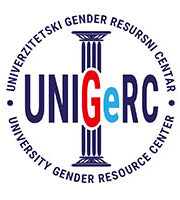Although the younger generations show positive changes in the expression of masculinity, and in general gender roles in the family and society, hegemonic masculinities are still widely present in the societies of the Balkans, concluded the participants of the panel titled “How to respond to toxic masculinity”, held on the 8th of March 2023 at 6:00 p.m. As part of the UNIGEM project, the TPO Foundation and the University Gender Resource Center (UNIGeRC) of the University of Sarajevo organized this event on the occasion of International Women’s Day with guests from BiH, Montenegro, Croatia, and Serbia.
Moderator of the panel, Adnan Rondić, emphasized the importance of discussing these topics, because it is noticeable that there are changes in public discourse around the world that show a large increase in violence against women, which is the result of cultivated or imposed toxic masculinity.
Panelist Jelena Ćeriman from Belgrade stated that “in every society, there is a norm of how to be a man and a woman, but the problem is that not everyone can meet those requirements and norms, for example, suppressing emotions, that is, the norm that men should not express all their emotions. Suppressed emotions are then modelled into something that is more acceptable, which is anger and violence.” Therefore, the pressure to be a man in a certain norm can lead to aggression and violence.
Siniša Bjeković from Podgorica believes that “toxic masculinity should be talked about every day, because it is difficult for men to give up adopted patterns of behaviour and he says that in society we have a worsening situation, especially in situations when a woman leaves her assigned role and public life.”
Ivan Ejub Kostić from Belgrade referred to the role of religious institutions that have an influence on the “unhealthy understanding of gender relations.”
Pavle Mijović from Sarajevo also referred to the role of religion in promoting acceptable masculinities and femininities and said that in the world one can see different political and religious currents that encourage traditional gender models. However, he believes that “religious communities have the potential to humanize society. Pope Francis wants to right the wrongs. He puts women as the heads of ministries and in the courts, in order to slightly break the male hegemony that creates a toxic climate. God is not determined by gender, but churches should humanize their attitude towards man, women, and minorities.”
Srđan Dušanić from Banja Luka, who researched masculinity in BiH and the region, presented some data from his research that shows slight progress, but that both men and women still have stereotypical understandings of gender roles.
Stipe Nogalo from Zagreb, who works with young people in Croatia, says that changes are visible after a series of educations with young men from secondary schools, for example, they are more willing to share housework and participate in parenting. However, he also emphasized that hegemonic masculinity is necessary for a system that generates hierarchical relationships.
Jelena Ćeriman also stated that there is a whole series of mechanisms for silencing women, ignoring their work, to the point of telling them that they are not ambitious and enterprising enough, and this is a form of benevolent sexism. That is why it is important to name certain things, identify them and then change the system.
At the end, Srđan Dušanić added that attitudes can be modified by changing each individual, to build self-esteem, self-confidence, and empathy, which leads to psychological maturity. When people are mature, they see that their gender roles are not immutable but socially constructed and can be changed.
Ivan Ejub Kostić said that it is important to stand out in public so that the religious field is not left to conservative currents, but also to form alliances with those who advocate more progressive ideas.
Siniša Bjeković emphasized that it should be remembered that all violent crimes are based on hatred towards women and that is not a healthy state of mind, which is why we should insist that the perpetrators be severely sanctioned, but also that we work with them to change them.



